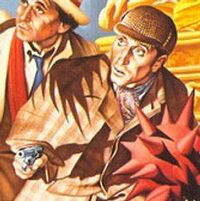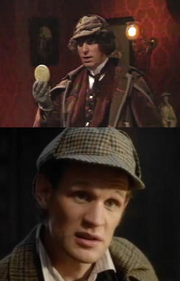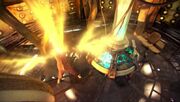With true name and origins shrouded in mysteries, (due to having a variety of different and contradictory accounts of their early life) "The Doctor" is the primary alias of a renegade Time Lord - an alien from outer space, born on the planet Gallifrey. He is over 2000 years old, [1] and supposedly had some meetings with Sherlock Holmes during those times.
Biography[]

The Doctor's stolen TARDIS flying away from Gallifrey. [2]
The Doctor was born on the planet Gallifrey. [3] The Doctor's real name is unknown, and, as described by Dorium Maldovar, it's "the first question" and "the question that must never be answered". [4]
Gallifrey was the home of the Time Lords, an ancient, powerful humanoid species who could control all the time and space, but had a rule: not to interfere in anything. [5] The Doctor broke this rule and was banished from his planet, becoming an exile. [citation needed]
He stole a Type 40 TARDIS [2][3] (Time And Relative Dimension In Space - a time/space travelling machine, [6] that's also alive [7][8][9][10]) and ran away with his granddaughter, Susan, to the planet Earth in the early 1960s. [6]
Since then, he had many adventures - inside and outside Earth - with many earthling companions.
Knowledge, Skills and Intelligence[]
The Doctor is one of the smartest being in the universe, possessed great knowledge beyond any humans understanding and knows incredible amounts of things about the universe. He claims to be able to speak 5 billion languages, including baby and horse. He is capable of easily deducing equipment to its point of origin, can know details of objects just by tasting/smelling them (this includes the smells and tastes of the air, as he once figured out that the Sontarans used the teleporter by tasting the air). Can tell where he is in the universe by looking at the alignment of stars. Has created various equipment/weapons out of nothing but junk on several occasions in order to defeats his enemies. Can bring down Harriet Jones' government with six words. Has a very in-depth knowledge on Earth history (Because of traveling their lots) and has picked up many skills from various historic people in his travels. He's also very cunning and manipulative, described as the "Trickster", he defeated many aliens, demons, or even god-like beings by using his intellects alone.
He is feared throughout the universe due to his intellects. Many creatures and beings have a greatly fears about the idea that what would happen if the Doctor ever go all out. The Daleks calls him "The Oncoming Storm", "The Predator", and "Bringer of Darkness" as he defeated them so many times. When he starts to lose his ways and becomes the "Time Lord Victorious", Adelaide Brooke doubt if there's no one to stop him, to which he replies "No.", when Brooke asks again is there nothing he can't do, he replies "Not anymore". When his companion Clara Oswald says that there's nothing he can do about Ashildr's death, he says that "I can do anything. There's nothing I can't do. Nothing." When Ashildr betrays him and caused Clara's death, he's says "I can do whatever the hell I like. You've read the stories. You know who I am. And in all of that time, did you ever hear anything about anyone who stopped me?", and "You'll find that it's a very small universe when I'm angry with you."
While usually preferring to handle situations without resorting to violence, The Doctor has been shown to use violence as a last resort as well as possessing a variety of self defense and hand to hand combat skills. He seems to have a background in fencing as shown in his sword fight with The Master in The Sea Devils. He was also shown to use a different variety of firearms in certain situations despite his reluctance to use firearms such as in Day of the Daleks, The Invasion of Time and Attack of the Cybermen and most infamously his experience fighting in the Time War during his War Doctor incarnation. His most well known method of defense however is his knowledge in Venusian Aikido, which the name suggests originated on the planet Venus, a more defensive martial art it allows the user to use his/her opponent's strength against as well as the ability to use pressure points techniques to stun opponents.
He's also possessed some kind of "mind palace" as shown in the episode Heaven Sent. He can speed up his thinking process to slow down his perception of time. His palace is shown to be he himself is standing in the TARDIS that is a "storm room" within his own mind, which he has created to give himself more time to think.
Connections with Sherlock Holmes[]

Sherlock Holmes and the Seventh Doctor. [11]
According to some sources, the Doctor and Holmes had some adventures together. [citation needed] While in his Second incarnation, the Doctor claimed to have met Sherlock, [citation needed] and, in his Fifth incarnation, even said that he used to live in 107 Baker Street, being an old friend and neighbour of Sherlock's. [citation needed] Later, the Sixth Doctor would describe Holmes as fictional, [citation needed] as would Walter Simeon, who claimed that Dr Doyle's stories about the Great Detective published in The Strand Magazine were "almost certainly" based on the exploits of the Silurian Madame Vastra and her wife Jenny Flint. [12] The Seventh Doctor quoted a saying of Holmes, to which his companion Ace described him as a fictional character. The Doctor asserted that he could still have spoken with him. [citation needed]
In All-Consuming Fire, the Doctor and Sherlock Holmes (along with Dr John Watson) investigates the situation revolving around the being which called itself "Azathoth", they later discovers that this Azathoth was not the real deal; to the Doctor, it was but a mockery, making its living by usurping the reputation of the real entity using its mild telepathic ability to control the faith of lesser beings. Sherringford Holmes, the eldest brother of Sherlock and Mycroft, has been converted fully to Azathoth's religion, forcing Sherlock to bludgeon his own brother to death using a length of pipe to save his best friend Watson. Shortly before Sherlock delivered the killing blow, a maddened Sherringford delivered his last words: "The horror… the horror!"
The Eighth Doctor had read The Hound of the Baskervilles and quoted the book after being chased by a dog in Dartmoor. [citation needed]
Sherlock's brother Mycroft had his own adventure within the Doctor Who universe when he assisted former seventh Doctor companion Bernice Summerfield in solving a mystery in The Adventure of the Diogenes Damsel.

The Fourth [13] and the Eleventh Doctors [12] wearing Sherlock Holmes's clothes.
The Doctor has worn clothes similar to Sherlock's look on two different occasions: In his Fourth incarnation, while visiting 1883's London, [13] and while visiting Victorian London to defeat living snowmen in his Eleventh incarnation. [12]
According to Andrew Hickey's The Book of the Enemy, at the "twilight of his career," Holmes had been researching effects of the "War in Heaven", and in the early 20th century, he realized that Earth's history was constantly being rewritten. Overwhelmed by the differences and conflicting memories between his world and the new one, Holmes read The Book of the Enemy. It erased him from history, and his entire life was turned into fiction.
The Doctor, when talking about Holmes in his seventh and eighth incarnations, cryptically hinted at some kind of permeability between "fiction" and "reality".
Behind the scenes[]

The Tenth Doctor regenerates into the Eleventh. [14]
Doctor Who started as a TV series on the BBC Television Service in 1963. In those times, the Doctor, who was played by actor William Hartnell, was just a mysterious alien. 3 years later, when Hartnell decided to quit the show, the British Broadcasting Corporation (BBC) decided to make up a way to continue the show, and then, the Doctor gained the ability of "regeneration" (also known as a change of appearance and renewal) - as a means of cheating death, his body suffers a transformation and his physical and psychological appearances change.
As of 2018, the Doctor had 14 different bodies, played by actors William Hartnell, Patrick Troughton, Jon Pertwee, Tom Baker, Peter Davison, Colin Baker, Sylvester McCoy, Paul McGann, John Hurt, Christopher Eccleston, David Tennant, Matt Smith, Peter Capaldi and Jodie Whittaker.
Hartswood Films made Sherlock, a modern day adaptation of Sherlock Holmes for BBC One, the same channel Doctor Who airs on. Sherlock was co-created by Doctor Who writer and showrunner Steven Moffat and Doctor Who writer and actor Mark Gatiss, and also has episodes scripted by Doctor Who writer Steve Thompson.
Some Doctor Who actors have also played Holmes in various movies, series and audio adaptations, such as Tom Baker, Nicholas Briggs, Peter Cushing, Jonathan Pryce, etc.
When discussing the creation of the Doctor's arch nemesis the Master played by Roger Delgado during the Jon Pertwee era in the documentary "Life On Earth" that was a special feature on the DVD release of "Terror of the Autons", producer Barry Letts and script editor Terrance Dicks confirmed that the Master was devised as "the Moriarty" to the Doctor's "Sherlock Holmes".
Notes[]
- Clara Oswald mentioned the Doctor was married four times. [3] According to writer Steven Moffat, this may refer to Queen Elizabeth I, [15] [16] Marilyn Monroe, [17] River Song [4] and an unnamed woman on Gallifrey to whom the Doctor was married for a long time. [18]
References[]
- ↑ Moffat, Steven (writer); Wheatley, Ben (director). 23 August 2014. "Deep Breath". Doctor Who. Series 8. Episode 1. BBC One.
- ↑ 2.0 2.1 Moffat, Steven (writer); Metzstein, Saul (director). 18 May 2013. "The Name of the Doctor". Doctor Who. Series 7. Episode 13. BBC One.
- ↑ 3.0 3.1 3.2 Moffat, Steven (writer); Talalay, Rachel (director). 8 November 2014. "Death in Heaven". Doctor Who. Series 8. Episode 12. BBC One.
- ↑ 4.0 4.1 Moffat, Steven (writer); Webb, Jeremy (director). 1 October 2011. "The Wedding of River Song". Doctor Who. Series 6. Episode 13. BBC One.
- ↑ Davies, Russell T (writer); Teague, Colin (director). 23 June 2007. "The Sound of Drums". Doctor Who. Series 3. Episode 12. BBC One.
- ↑ 6.0 6.1 Coburn, Anthony (writer); Hussein, Waris (director). 23 November 1963. "An Unearthly Child". Doctor Who. Season 1. Episode 1. BBC tv.
- ↑ Jacobs, Matthew (writer); Sax, Geoffrey (director). 14 May 1996. Doctor Who. Fox.
- ↑ Davies, Russell T (writer); Ahearne, Joe (director). 4 June 2005. "Boom Town". Doctor Who. Series 1. Episode 11. BBC One.
- ↑ Davies, Russell T (writer); Ahearne, Joe (director). 18 June 2005. "The Parting of the Ways". Doctor Who. Series 1. Episode 13. BBC One.
- ↑ Gaiman, Neil (writer); Clark, Richard (director). 14 May 2011. "The Doctor's Wife". Doctor Who. Series 6. Episode 4. BBC One.
- ↑ Doctor Who: New Adventures - All-Consuming Fire
- ↑ 12.0 12.1 12.2 Moffat, Steven (writer); Metzstein, Saul (director). 25 December 2012. "The Snowmen". Doctor Who. 2012 Christmas special. BBC One.
- ↑ 13.0 13.1 Holmes, Robert (writer); Maloney, David (director). 26 February 1977–2 April 1977. The Talons of Weng-Chiang. Doctor Who. BBC1.
- ↑ Davies, Russell T (writer); Lyn, Euros (director). 1 January 2010. "The End of Time Part Two". Doctor Who. Series 4. Episode 18. BBC One.
- ↑ Davies, Russell T (writer); Lyn, Euros (director). 25 December 2009. "The End of Time Part One". Doctor Who. Series 4. Episode 17. BBC One.
- ↑ Moffat, Steven (writer); Hurran, Nick (director). 23 November 2013. "The Day of the Doctor". Doctor Who. 50th anniversary special. BBC One.
- ↑ Moffat, Steven (writer); Haynes, Toby (director). 25 December 2010. "A Christmas Carol". Doctor Who. 2010 Christmas special. BBC One.
- ↑ Moffat, Steven. "Steven Moffat". Doctor Who Magazine 482. February 2015. Tunbridge Wells: Panini UK Ltd, p. 2.
